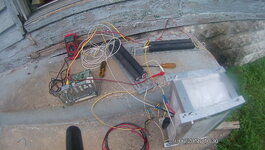You are using an out of date browser. It may not display this or other websites correctly.
You should upgrade or use an alternative browser.
You should upgrade or use an alternative browser.
LiOn battery draw tester
- Thread starter canadmin
- Start date
6zfshdb
Well-Known Member
- Region
- USA
- City
- Northeast Pennsylvania
The only one I'm familiar with is a product from Grin Tech in Vancouver. It's called a "Grinspector" but unfortunately, it was discontinued in 2022:
 ebikes.ca
ebikes.ca
There was an EBR member selling one in the classified section last year. You might try to PM him to see if he sold it:

 forums.electricbikereview.com
forums.electricbikereview.com
If you're a DIY'er, you can make a crude tester using old incandescent light bulbs and a multimeter:


The load can be adjusted by adding or removing bulbs from the string. I can get a 20A load using some old 300 W bulbs. By measuring the voltage drop as you add load, you can get a fairly good idea of the battery condition.
Capacity loss can be checked by timing how long it takes to discharge using a known load. Care should be taken so as not to over discharge.
I added a timer so the rig can be used to discharge batteries to the proper voltage for storage:

One of the tricky parts in making such a rig is tapping the battery discharge connectors. My batteries all use the flat spade type. It was simple to cut the plug in half on an old extension cord. The prongs on the plug fit the battery perfectly.


Battery Grinspector
Battery discharge and cycling station based around a Cycle Analyst*Please allow 3-6 days manufacturing time. Full Product Information Page
There was an EBR member selling one in the classified section last year. You might try to PM him to see if he sold it:

Grinspector Battery Tester & Dummy Load
For sale, a brand new, never used Grin (ebikes dot ca) electric bike battery tester (based on their famous Cycle Analyst). You can hook this up to a PC to show battery performance. Never used... that is why the load bank doesn't have any colour change. Retails for $350 Canadian. Selling for...
If you're a DIY'er, you can make a crude tester using old incandescent light bulbs and a multimeter:
The load can be adjusted by adding or removing bulbs from the string. I can get a 20A load using some old 300 W bulbs. By measuring the voltage drop as you add load, you can get a fairly good idea of the battery condition.
Capacity loss can be checked by timing how long it takes to discharge using a known load. Care should be taken so as not to over discharge.
I added a timer so the rig can be used to discharge batteries to the proper voltage for storage:
One of the tricky parts in making such a rig is tapping the battery discharge connectors. My batteries all use the flat spade type. It was simple to cut the plug in half on an old extension cord. The prongs on the plug fit the battery perfectly.
Last edited:
il Munduato
Well-Known Member
- Region
- USA
indianajo
Well-Known Member
I used four 5 ohm 225 w resistors connected in series and parallel as a load to test a 48 v battery. 10 amps at 50 volts. My battery had .250" flag terminals on wires. I used 14 ga wire with flag terminals for connections. A parallel voltmeter will detect the garbage. I had one battery drop to 11 volts during this test, then snap back to 53 v immediately after disconnect. https://www.digikey.com/en/products/detail/vishay-huntington-electric-inc/FVT20020E5R000JE/257612
I bought my resistors for $6 each at surplus house Apexelectronic but he is out of that business now. Were also useful for testing PA amplifiers at 300 watts.
Do this test on concrete or dirt surface in case of fire. Wear safety glasses and do not touch the battery or resistors during test. the computer looking part mounts a 30 amp switch from the auto supply. The white plastic wrapped in aluminum angle was the battery.
I bought my resistors for $6 each at surplus house Apexelectronic but he is out of that business now. Were also useful for testing PA amplifiers at 300 watts.
Do this test on concrete or dirt surface in case of fire. Wear safety glasses and do not touch the battery or resistors during test. the computer looking part mounts a 30 amp switch from the auto supply. The white plastic wrapped in aluminum angle was the battery.
Attachments
Last edited:
PCeBiker
No-Hands No-Pedaling No-Credentials
- Region
- Canada
Digikey is a great source for anything electronic. They've got just about everything that you can think of, and they are based in the USA so they don't sell junk that gets returned.
I bought a 5 amp 60 volt bench power supply on AliExpress that lasted a year before it crapped out.
I replaced it with a 3 amp 60 volt bench power supply from Digikey that cost twice as much.
It was the cheapest 60 volt power supply they offer at $170 CAD plus tax.
It's still made in China, like everything else, but it's from a vetted source that Digikey stands behind.

This 60 volt 24 amp programmable bench power supply is pretty cool, but at $3,700 CAD it was a little out of my price range.

I bought a 5 amp 60 volt bench power supply on AliExpress that lasted a year before it crapped out.
I replaced it with a 3 amp 60 volt bench power supply from Digikey that cost twice as much.
It was the cheapest 60 volt power supply they offer at $170 CAD plus tax.
It's still made in China, like everything else, but it's from a vetted source that Digikey stands behind.
This 60 volt 24 amp programmable bench power supply is pretty cool, but at $3,700 CAD it was a little out of my price range.
Last edited:
Anyone find something more turnkey? Was looking at the ET5410a+ or the KP184. The primary purpose will be to load test my ebike batteries (15Ah, 48V nominal) to confirm they are within spec. But I also have 12V lipo car batteries and other misc batteries and having a way to easily test their capacity woudl be great. Thoughts?
Update -- seems like the ET5301 would be a better fit. 150V and 60A. Thinking this would provide more headroom and likely last longer.
Update -- seems like the ET5301 would be a better fit. 150V and 60A. Thinking this would provide more headroom and likely last longer.
Last edited:
6zfshdb
Well-Known Member
- Region
- USA
- City
- Northeast Pennsylvania
Contact Matt Bzura through Bicycle Motor Works in Bethlehem, PA. at 484-793-2541
He should be able to help with custom battery work, and may also recommend a tester.
Grin Tech in Vancouver made a product called "Grinspector" but it was discontinued in 2022. You might try contacting them about a replacement product. You may also be able to find a used one.
He should be able to help with custom battery work, and may also recommend a tester.
Grin Tech in Vancouver made a product called "Grinspector" but it was discontinued in 2022. You might try contacting them about a replacement product. You may also be able to find a used one.
harryS
Well-Known Member
I use an Atorch DL24P to load test my batteries, It can put a 3 amp load on a 48V battery and measure the watt hours or AH that the battery can produce down to its low voltage cutoff, It's very reproducible. Testing at low currents is closer to how the cells are rated by the manufacturers so I haven't felt like spending bigger bucks on 20A testers. At 48V, that's like 1000 watts of power you have to disspiate in your imstruments. It can be done, but expensive,
I think measuring how much current a lithium battery will deliver is difficult and probably not relevant What you might care about is their voltage sag under the load on your bike. Most of my bikes have voltmeters, so I look at that while riding. Running at 100 watts, I'm happy if it only drops ..40 volts, If I blip the throttle, and knowing the bike will pull 20 amps, a good drop for me is 4 volts. I've had old tired batteries that drop 8-10 volts doing that. That means they'll shut off when down 50%, No longer useful. The cheapo $15 wattmeters will do this automatically, measuring both the max current and the max voltage sag, I assume that both events go together, go out and ride, stop and see what was stored.
I think measuring how much current a lithium battery will deliver is difficult and probably not relevant What you might care about is their voltage sag under the load on your bike. Most of my bikes have voltmeters, so I look at that while riding. Running at 100 watts, I'm happy if it only drops ..40 volts, If I blip the throttle, and knowing the bike will pull 20 amps, a good drop for me is 4 volts. I've had old tired batteries that drop 8-10 volts doing that. That means they'll shut off when down 50%, No longer useful. The cheapo $15 wattmeters will do this automatically, measuring both the max current and the max voltage sag, I assume that both events go together, go out and ride, stop and see what was stored.
PCeBiker
No-Hands No-Pedaling No-Credentials
- Region
- Canada
This is all you need,.

You can see the voltage sag and current draw in real time.
It keeps track of the battery capacity.
You get real world results which I think is more important than what a battery can do on the bench.
You can even test the battery at 20 amps if you're controller will pull that much current.
EDIT: That's an AC energy meter.
You might have to use this one, and install a shunt.

I'm having a hard time finding a similar Watt hour meter that uses a coil instead of a shunt.
A coil is a bit tricky with DC current.

You can see the voltage sag and current draw in real time.
It keeps track of the battery capacity.
You get real world results which I think is more important than what a battery can do on the bench.
You can even test the battery at 20 amps if you're controller will pull that much current.
EDIT: That's an AC energy meter.
You might have to use this one, and install a shunt.

I'm having a hard time finding a similar Watt hour meter that uses a coil instead of a shunt.
A coil is a bit tricky with DC current.
Last edited:
PCeBiker
No-Hands No-Pedaling No-Credentials
- Region
- Canada
I'm having a hard time finding a similar Watt hour meter that uses a coil instead of a shunt.
Here we go,..
No shunt to deal with.
Leoguar bikes
New Member
- Region
- USA
This kind of battery tester works both on lithium-ion and lead acid battery, you can set discharging current (max 20A if I am not mistaken, should be enough for you) and stop voltage, gets a fan inside to release heat, pretty nice choice, I got 2 already.
Leoguar bikes
New Member
- Region
- USA
Anyone find something more turnkey? Was looking at the ET5410a+ or the KP184. The primary purpose will be to load test my ebike batteries (15Ah, 48V nominal) to confirm they are within spec. But I also have 12V lipo car batteries and other misc batteries and having a way to easily test their capacity woudl be great. Thoughts?
Update -- seems like the ET5301 would be a better fit. 150V and 60A. Thinking this would provide more headroom and likely last longer.
This one might meet your needs.

